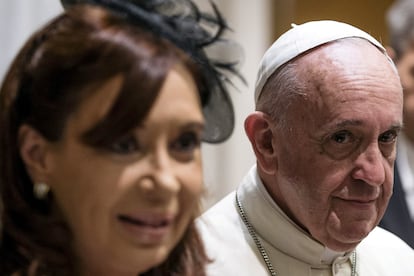Pope Francis reveals that Argentina’s government under Kirchner tried to put him in prison
‘They questioned all my actions during the dictatorship,’ said the Pontiff in a conversation with Jesuits in Hungary


Pope Francis has revealed that, while he was still the Archbishop of Buenos Aires, the government of Cristina Fernández de Kirchner gave “indications” to three judges that they should convict him for his actions during the dictatorship (1976-1989). The Pontiff told 32 Jesuits whom he visited in Hungary about a lengthy judicial statement that he had to give in 2010 over the 1976 kidnapping of the priests Orlando Yorio and Ferenc Jalics, accused by the military of having ties to the guerrillas.
“Some in the government wanted my head on a platter, and they brought up not so much this matter of Jalics [who was of Hungarian descent], but instead questioned my entire set of actions during the dictatorship,” said the Pontiff. The dialogue with the priests took place on April 29 and was reported by La Civiltá Cattolica, an Italian Jesuit magazine whose contents get greenlighted by the Vatican.
On November 8, 2010, the man who was still known as Archbishop Bergoglio testified in the framework of the ESMA case, an ongoing investigation into the military’s actions at the largest illegal detention and torture center in Argentina during the dictatorship. A journalist named Horacio Verbitsky with ties to Kirchnerism had accused Bergoglio of having “handed over” Jalics and Yorio to their captors from his position as provincial superior of the Jesuits. Bergoglio told the judges who questioned him that he had pleaded for the priests before the dictator Jorge Rafael Videla and his deputy on the military junta, Admiral Eduardo Massera.
“They gave me the possibility to choose the place in which to carry out the interrogation. I chose to do it at the Episcopium [bishop’s palace]. It lasted four hours and 10 minutes. One of the judges was very insistent about my behavior [during the dictatorship]. I answered truthfully at all times. But, in my view, the only serious and well-founded question was the one posed by the lawyer who belonged to the Communist Party. And thanks to that question things became clear. In the end, my innocence was proven. But at that judgment almost nothing was said about Jalics, and instead about other cases of people who had asked for help,” said the Pope, quoted by La Civiltá Cattolica. “When Jalics and Yorio were arrested by the military, the situation in Argentina was confusing and it was not at all clear what should be done. I did what I felt I had to do to defend them. It was a very painful situation,” he added.
When Bergolgio became Pope Francis in 2013, many in Argentina still believed that he had not done enough during the dictatorship for the “disappeared” detainees. Some even accused him of complicity with the regime. The role of the then-archbishop during the 1970s is part of an extensive study that the Catholic Church carried out based on hundreds of thousands of files that were in the Episcopate in Buenos Aires and in the Vatican. The result of this work was published this year in two volumes (there is a third underway) under the title The Truth Will Set You Free. In an interview with EL PAÍS, the rapporteur of the investigation, Carlos María Galli, said that the Church should have “done more to avoid so much killing,” but denied that there had been any complicity.
Regarding the role of Bergoglio, he said that the attacks against him were “a bit contrived because they were useful to whichever government happened to be in place,” in this case, the Cristina Fernández de Kirchner administration. “When they considered him an opponent, they began to attack him. One of the elements involved re-reading the story of the two Jesuits arrested in 1976 [Jalics and Yorio] and saying that Bergoglio had set them free in order to make them vulnerable. Bergoglio helped save at least 30 people,” said Galli.
Pope Francis also told the Hungarian Jesuits that years later, when he was already the pontiff, the judges who had questioned him in 2010 revealed to him that they had been pressured by the government to convict him. “I have seen two of the judges here again, in Rome. One of them came with a group of Argentines. I didn’t recognize him, but I had the impression that I had seen him before. I kept looking at him, and said to myself, ‘I know him.’ He gave me a hug and left. I saw him one more time, and he introduced himself. I told him to be at peace with this story. Yes, I deserve to be judged for my sins, but on this point I want to be clear. Another one of the three judges also came, and told me clearly that they had received indications from the government to sentence me.”
The priests Ferenc Jalics and Orlando Yorio used to work in a poor neighborhood in the city of Buenos Aires, and they were soon targeted by the military. “In the neighborhood where they worked, there was a guerrilla cell. But the two Jesuits had nothing to do with them: they were pastors, not politicians. But they were still taken prisoner, despite being innocent. They [the military] did not find anything with which to accuse them, but they still had to serve nine months in jail, suffering threats and torture. Then they were released, but these things leave deep wounds,” said the Pope. “Jalics came to see me immediately, and we chatted. I advised him to go see his mother in the United States. The situation was really too uncertain and confusing. Then the myth arose that it was I who had handed them over to be imprisoned.”
At the close of his talk with the Hungarian Jesuits at the Budapest Nunciature [the diplomatic representation of the Holy See], he told them to read The Truth Will Set You Free: ”There you will be able to find the truth about this case.”
Sign up for our weekly newsletter to get more English-language news coverage from EL PAÍS USA Edition
Tu suscripción se está usando en otro dispositivo
¿Quieres añadir otro usuario a tu suscripción?
Si continúas leyendo en este dispositivo, no se podrá leer en el otro.
FlechaTu suscripción se está usando en otro dispositivo y solo puedes acceder a EL PAÍS desde un dispositivo a la vez.
Si quieres compartir tu cuenta, cambia tu suscripción a la modalidad Premium, así podrás añadir otro usuario. Cada uno accederá con su propia cuenta de email, lo que os permitirá personalizar vuestra experiencia en EL PAÍS.
¿Tienes una suscripción de empresa? Accede aquí para contratar más cuentas.
En el caso de no saber quién está usando tu cuenta, te recomendamos cambiar tu contraseña aquí.
Si decides continuar compartiendo tu cuenta, este mensaje se mostrará en tu dispositivo y en el de la otra persona que está usando tu cuenta de forma indefinida, afectando a tu experiencia de lectura. Puedes consultar aquí los términos y condiciones de la suscripción digital.








































